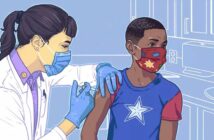Strep Throat: What You Need to Know
Kids often come down with sore, scratchy throats. Colds and other viruses are usually to blame. Irritants such as smoke in the air can also make you feel raw.
Strep throat is different — it’s caused by bacteria. You need to know whether you or your child has strep or another illness so you can get the right treatment.
How Do I Catch It?
Strep throat is an infection of the throat and tonsils. Bacteria called group Astreptococcus, also known as Streptococcus pyogenes. cause it. They live in the nose and throat. You can get the infection from someone who is sick with strep A bacteria or is a carrier of it.
Like other infections, it spreads through close contact. When people who are sick cough or sneeze, they release droplets into the air that hold the bacteria.
You can infect yourself if you touch something a person with strep has coughed or sneezed upon and then brush your eyes, mouth, or nose with your hand. You can also get sick if you share a glass or other personal item with someone who has strep.
Strep is most common in children and teens. Adults can sometimes get it, too.
Symptoms
- A fever of 101 F or higher
- Red, swollen tonsils
- White patches in the throat
- Tiny red spots on the roof of the mouth
- Appetite loss
- Stomachache
- Headache
- Nausea, vomiting
- Rash
Call your doctor if you or a child in your care has these symptoms.
How Is It Diagnosed?
Your doctor will ask about your child’s symptoms. The only sure way to tell strep from viruses that cause a sore throat is with a test. There are two kinds:
Rapid strep test: It can identify a case in just a few minutes. The doctor will gently hold down your child’s tongue with a depressor. Then, she will use a cotton swab to take a sample from the back of the throat.
You’ll get the results in 20 minutes or less. If the test is positive, which means strep is there, the doctor will prescribe antibiotics to treat it.
If the test is negative, which means the strep bacteria could not be found, the doctor might send the sample to a lab for a follow-up that takes longer.
Throat culture: She will rub a swab over the throat and tonsils to be sent to the lab. If your child has strep throat, streptococci bacteria will grow in it.
It usually takes about 2 days to get results from a throat culture. It can confirm whether your child has strep throat or not.
Treatments
Your doctor will prescribe antibiotics to kill the bacteria that cause the infection. Most treatments last for about 10 days. The medicine can make your child’s symptoms go away faster and help prevent complications.
Make sure your child takes all of the doses. Stopping the medicine too early can leave some bacteria alive. These can make your child sick again. Be sure to tell the doctor if your young one is allergic to any types of antibiotics.
If the strep test is negative, a virus likely caused the sore throat. Your child doesn’t need antibiotics because these medications don’t work on viruses.
Self-Care Tips
Try these home treatments to ease symptoms:
- Gargle with a mixture of a quarter-teaspoon of salt and 8 ounces of warm water.
- Take ibuprofen (Motrin, Advil) or acetaminophen (Tylenol) to bring down a fever and ease pain. Don’t give aspirin to children or teens. It can cause a rare but dangerous condition called Reye’s syndrome.
- Suck on a throat lozenge or piece of hard candy. Don’t give small pieces of candy to children younger than 4.
- Drink warm liquids such as tea and broth. Or, suck on something cold such as an ice pop.
- Pass on orange juice and other drinks that have a lot of acid. They’ll sting.
- Get lots of rest
How to Keep It From Spreading
Have your child stay home from school or daycare until the fever is gone and he has been on an antibiotic for at least 24 hours. Same for you and the workplace. Other tips:
- Don’t share cups, dishes, forks, or other personal items with someone who’s sick.
- Ask children to cover their mouths with a tissue or sleeve whenever they cough or sneeze.
- Have everyone in the house wash their hands or use an alcohol-based hand sanitizer many times daily.
Possible Complications
Strep complications are rare today, thanks to better diagnosis and treatment. Yet untreated strep can cause serious diseases, such as:
-
- Abscess around the tonsils or behind the throat; an abcess is a collection of pus that can be extremely painful.
- Rheumatic fever, which can damage the heart, brain, and joints
- A kidney disease called glomerulonephritis




